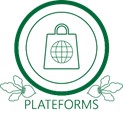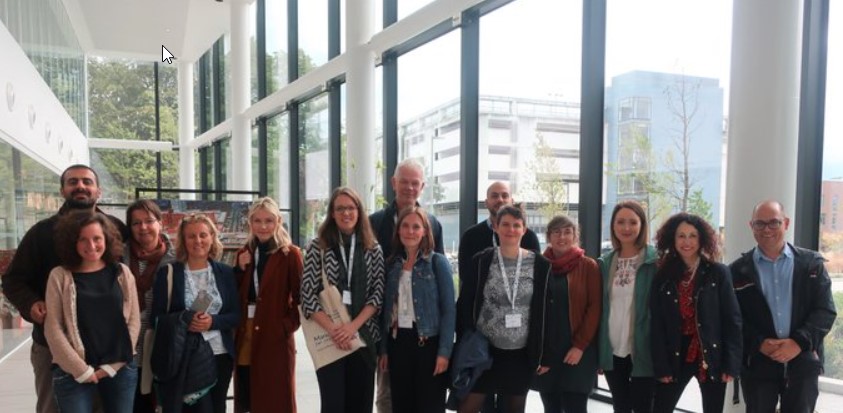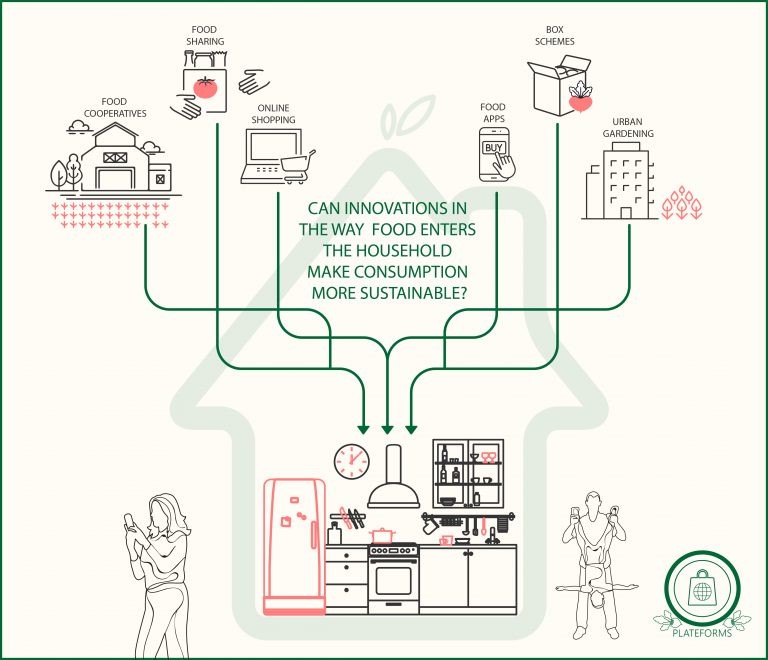Sustainable Food Platforms: Enabling sustainable food practices through socio-technical innovation

Introduction / Background
Estimates show that the global food system contributes to about 20-30% of the total global GHG emissions. Food consumption is at the heart of the food regime, as consumer choices significantly influence the use of resources and environmental effects of production, distribution, and consumption. The choices consumers make in terms of their food consumption is connected to the ways in which their food is provided to them. With the technical advances of the last decade as well as the increase in consumer driven food supply, new platforms of food provisioning have emerged that may represent significant opportunities to enable and upscale sustainable food consumption.
As of now, little is known about the potential of these platforms to promote sustainable food consumption on a larger scale. Consumers may now purchase their food from online food retailers, box schemes, farmers markets or indeed, from other consumers. Each food provisioning system or platform presents consumers with unique choices. This new range of food provision has emerged from both e-commerce development and consumer-driven food provisioning. However, very little is known about the impact of these new platforms on food choices and whether they represent new opportunities to promote sustainable food practices in the home.
Aim
PLATEFORMS aims to produce in-depth knowledge on how food practices in the home are affected by new innovations in food provisioning platforms. These innovations may be social (e.g. urban gardening, buying clubs, food cooperatives) or technical (e.g. online supermarket/niche store, box schemes, sharing apps). This project takes a socio-technical practice approach, viewing consumption in all its phases of planning, provisioning, storing, cooking, eating, and disposing. The focus is on these practices as performed in the home rather than on individual choices. The project will include both business-driven platforms (e.g. supermarkets/ online stores) and consumer-driven platforms (e.g. food cooperatives) in Norway, Sweden, Germany, Italy and Ireland.
The main aims of the project are to:
- Produce a catalogue of contemporary European sustainability initiatives related to modes of food provisioning
- Explore how socio-technical innovations in food provisioning platforms can drive/facilitate sustainable food consumption in households
- Suggest strategies to implement and emphasize drivers of sustainability in this context
- Examine the possibility of scaling up these sustainable food consumption platforms
Expected results
The project will promote sustainable food choices through involvement with platform owners, dissemination of academic results and communication of sustainable success stories across countries and platforms. The communication will target platforms owners, policy makers, and NGOs. By producing new in-depth knowledge about concrete strategies to enable sustainable food consumption through food provisioning platforms, the project will affect consumer practices and choices on a larger scale. Moreover, through intervention studies and collaboration with platform owners, it will be possible to quantify the effect of interventions.
Keywords
Sustainable food consumption, household food practices, provisioning platforms, socio-technical innovation

Project consortium
Coordinated by
Dr. Arne Dulsrud - Oslo and Akershus University College of Applied Sciences NORWAY
Partners
- IRELAND: University College Cork
- SWEDEN: University of Gothenburg
- ITALY: University of Trento
- GERMANY: Humbold-Universität zu Berlin
Runtime project
ThePLATEFORMS project started on 01/05/2018 and runs until 30/10/2021.
Follow the project
More information
- Project presentation by Arne Dulsrud. SUSFOOD meeting in Stockholm. 27th October 2018
- Project presentation by Claire O’ Neill UCC. Climate Change Conference UCC. Environmental Society. 23d Feb. 2019
- Project presentation 2 by Claire ONeill. Circular Economy UCC
- Netthandel med mat – blir dette en viktig markedskanal? [E-commerce for food – will it become an important market channel?] by Frode Alfnes. Nettmat Midtnorsk landbrukskonferanse. November 2018
- Presentation at the Federal Ministry of Food and Agriculture_Germany
- Poster presentation EFAS conference_Germany
- Presentation SUSFOOD2 - 27 November in Ghent
- Presentation by Dr. Shadi Hashem at PLATEFORMS webinar in Ireland
- Plateforms meeting at the ESA conference 2019 in Manchester - Poster presentation
- Project mid-term poster
Research articles
- Making “good food” more practicable? The reconfiguration of alternative food provisioning in the online world
- Fridge studies – Rummage through the fridge to understand food waste
- Digitally enabling sustainable food shopping: App glitches, practice conflicts, and digital failure
- Unpacking package free shopping: Alternative retailing and the reinvention of the practice of shopping, Journal of Retailing and Consumer Service
- Towards food platforms? An analysis of online food provisioning services in Italy
- Devising food consumption: complex households and the socio-material work of meal box schemes
- Mind the Gap between the Pipeline and the Platform: An Analysis of Online Food Provisioning Services in Italy
- NEW: Digital Food Provisioning in Times of Multiple Crises: How Social and Technological Innovations Shape Everyday Consumption Practices
- Feature story by Marie Hebrok and Nina Heidenstrøm in the Norwegian press (English translation): Sustainable food consumption cannot be framed as the responsibility of the individual
- New online press articles in Italian about the Plateforms project
- Meike Brückner and Suse Brettin present PLATEFORMS in interview at the International Green Week in Berlin (in German)
- In EchoLIVE.ie: Five steps to help you do your bit for global sustainability in 2019, by Dr. Claire O’Neill UCC,
- Pressemitteilung (Press release in German)
- Feature story by Kamilla K. Steinnes and Frode Alfnes (SIFO): Mail order food: Online niche food extends product range
- In RTE.ie: A food World War: are we ready for the ration book?, by Mary McCarthy, Claire O’Neill and Shadi Hashem
- Families sought for UCC food study
Reports
Videos
